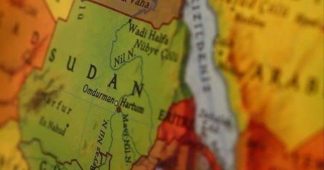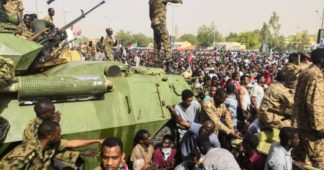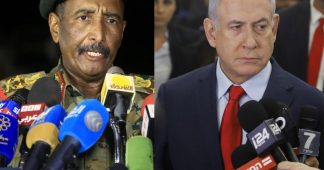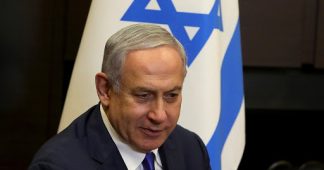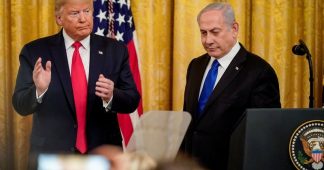In January 2021, Sudan joined the UAE, Bahrain and Morocco and normalized its relations with Israel. This paper explores the record of largely back-door dealings between Khartoum and Tel Aviv, investigates the motives, weighs the bargains, and interrogates the ideological mystifications that cloud the policy choices of Sudan’s decision-makers.
By Magdi El-Gizouli
Sudanese academic and Fellow at the Rift Valley Institute
Aug 17, 2021
Khartoum’s new rulers joined the Washington-minted Abraham Accords in January 2021 after a series of contacts and talks involving Khartoum and Tel Aviv with intense U.S. and Emirati mediation, talks that had begun in earnest soon after the demise of former president Bashir’s regime in April 2019. Bashir’s successors understand themselves as a direct antidote to the politics of Bashir and his Islamist support base and hence were keen to capitalise on winning the favour of his many enemies in the region. Once a friendly host to Palestinian Hamas and Islamic jihad and an open conduit for weapons and supplies passing to the Gaza Strip, Sudan was now eager to become a partner in a regional order predicated on the security of Israel. The paper explores the record of largely back-door dealings between Khartoum and Tel Aviv, investigates the motives, weighs the bargains, and interrogates the ideological mystifications that cloud the policy choices of Sudan’s decision makers.
An Agreement with a History Dating back to the Cold War
Fifty-four years earlier, Khartoum played host to injured Nasser, freshly humiliated in the Six Day War of 1967 and needy for the adrenaline gushes of elated masses. The Khartoum Arab League summit of 1967, held 29 August to 1 September 1967, was supposed to showcase unbreakable sumoud, steadfastness and resolution. In Khartoum, the Arab presidents and princes declared in unison their three no’s: “no peace with Israel, no recognition of Israel, no negotiations with Israel”. An alternative interpretation of the apparent rejectionism of the Khartoum summit suggests a de facto acceptance of Israel’s really-existing settler colonialism, a nod at political arrangements short of formal peace treaties, and a willingness to seek the mediation of good quarters.
Khartoum’s rulers were not by definition disinclined towards Israel. Sudan featured prominently in Israel’s “periphery doctrine” already in the 1950s, a strategy devised in response to the threat of Nasserite Egypt. The hallmarks of this strategy were laid out by Reuven Shiloah, the founding father of the Mossad, Israel’s national intelligence agency. According to Shiloah, Arabs were besieged by two rings of threat: an external ring that involves non-Arab nations and an internal ring that consists of religious and ethnic minorities. According to this rationale, Israel shares with these two rings antagonism towards Arab nationalism. Shiloah prioritised among elements of the second circle the Maronites in Lebanon, the Druze in Syria, the Kurds in Iraq, and the peoples of southern Sudan.1
Strategy is well and good, but opportunities are for the taking. Such an opportunity arose during the intense politicking at the dawn of Sudan’s independence in January 1956. Israel was averse to the possibility of a Sudanese-Egyptian alliance under a Nasserite banner and found an anxious ally in the Umma Party of Abd al-Rahman al-Mahdi, posthumous son of the Mahdi, Sudan’s 19 century anticolonial hero. Umma Party stalwarts at the time were keen to counter Nasserite political and military influence in Sudan.
As early as 1954, contacts were established between Umma Party officials and Israeli diplomats in London and, in late August 1956, a senior Sudanese official reportedly visited Israel to discuss economic assistance to the Umma Party. At a more senior level, August 1957 witnessed a meeting between Sudan’s prime minister Abdalla Khalil of the Umma Party and Israel’s foreign minister Golda Meir in Paris. In accordance with the Paris understandings, Israel’s prime minister David Ben-Gurion appealed to the US president Eisenhower to extend political and financial support to the Umma Party government.2
Abdalla Khalil, the soldier-premier, polo player, and big game hunter, had approached the U.S. government in February 1957 asking for economic and military assistance ahead of a visit by vice president Richard Nixon in March of the same year. “The huge Moslem country, three times bigger than Texas, could either be a bridge or a dam to communism in Africa. The trend of the Khalil government is definitely pro-Western and in the Arab League alignment the government leans towards Iraq rather than Egypt”,3 wrote the editor of the New York Times in unequivocal Cold War terms.
The prime minister had no idea how much aid to ask for or what precisely to do with it, but he wanted a lean and well-equipped army, improved communications, and agricultural technology. He was frustrated by the repercussions of the closure of the Suez Canal in the context of the 1956 tripartite war against Egypt on Sudan’s lifeline, its cotton exports. “We do not hate anybody”, he told the Times correspondent. “We only hate the words ‘anti’ and ‘against’. We are peaceful and friendly”. “I want to develop this country and raise the standard of the people”, proclaimed the prime minister, who had not worked out an idea of what to do with the aid he was asking for.4
Abdalla Khalil’s government did not last to reap the fruits of his appeals to Israel and the U.S; the issue proved political dynamite. Protests against the proposed American aid orchestrated by the communist Anti-Imperialist Front and the pro-Egyptian National Unionist Party (N.U.P.) destabilised his government.5 As a result of the closure of the Suez Canal, Sudan was not able to market its 1957 cotton crop and the 1958 crop proved a failure. Incapable of mustering a functional ruling majority in parliament, he effectively invited the army generals, his former colleagues in arms, to assume power – which they did in November 1958.6 Abdalla Khalil, democracy aside, welcomed the coup that ousted him, saying it blocked an attempt to annex Sudan by Nasser’s Egypt. The flirtation with Israel ended just there. The rowdy parliament that Abdalla Khalil attempted in vain to reign had in July 1958 approved a legislation to boycott Israel in a wave of support for Egypt in the context of the tripartite war. This short piece of legislation was repealed by a joint session of the cabinet and the sovereignty council, Sudan’s collegial presidency, on 6 April 2021.
Economic distress, the pursuit of U.S. favour, corresponding regional alliances, a utilitarian foreign policy à la Bentham, and an ideology of missionary developmentalism were the main elements of Abdalla Khalil’s reasoning. These same elements equally informed the decision of the partners of Sudan’s transitional government to ‘normalize’ relations with the Zionist entity as part of former U.S. president Trump’s ‘deal of the century’, an epithet coined by the Israeli prime minister Benjamin Netanyahu.7
The Timeline of a Deal
The timeline of the contemporary effort at normalization of relations between Khartoum and Tel Aviv clarifies the stakes at hand, primarily the quest of Sudan’s rulers for new sources of credit to manage a punishing economic crisis and stabilise an ever-mutating political field, whether with guns or with money. Sudan’s military ruler, General Abd al-Fattah al-Burhan, met with the Israeli prime minister Benjamin Netanyahu in Uganda’s Entebbe on 3 February 2020. The Sudanese leader said the meeting came “within the framework of Sudan’s efforts for its national and security interests” and stressed Tel Aviv’s role in supporting Sudan’s efforts to exit the U.S. state sponsors of terrorism list. The event, disclosed only after it happened, was coordinated by the U.S. with involvement of Sudan’s regional patrons: Saudi Arabia, the United Arab Emirates (U.A.E.), and Egypt. The step was received with much clapping and appreciation by the Trump administration. Within weeks, Sudanese airspace was open to Israeli planes.
Meanwhile, Sudan agreed in May 2020 to pay 335 million U.S. dollars to victims of the 1998 bombings of the U.S. embassies in Kenya and Tanzania and 2000 bombing of the U.S.S. Cole off the coast of Yemen in an out-of-court settlement. Mike Pompeo, former U.S. secretary of state, flew to Khartoum in August 2020 to accelerate talks on the normalization of ties between Sudan and Israel. He failed to clinch a deal just then but further talks continued in September 2020 in the U.A.E. The Sudanese government reportedly demanded in return a supple economic support package including oil and wheat shipments worth 1.2 billion dollars, an immediate 2 billion US dollars grant and pledges of further aid from the U.S. and the U.A.E. over 3 years.
A joint U.S.-Israeli delegation held talks with General al-Burhan in Khartoum on 22 October 2020 in a final push for an agreement. On 23 October 2020 former U.S. president Donald Trump declared that Sudan would be the third Arab country to normalize relations with Israel on the tails of the U.A.E. and Bahrain, as part of his administration’s so-called Abraham Accords. The office of the Israeli prime minister said on 25 October 2020 Tel Aviv would send 5 million U.S. dollars’ worth of wheat to its new friends in Khartoum to make peace warm, or rather edible.
On 14 December 2020 Washington formally rescinded Sudan’s designation as a ‘state sponsor of terrorism’. The normalization deal was sealed on 7 January 2021 in Khartoum by Sudan’s Harvard-educated justice minister Nasr al-Din Abd al-Bari and the former U.S. treasury secretary Steven Mnuchin. In return, the U.S. provided Sudan with a 1 billion U.S. dollar bridge loan to clear its arrears with the World Bank as part of a larger effort to address Sudan’s crushing foreign debt burden. A few days later the Israeli intelligence minister Eli Cohen arrived in Khartoum at the head of a security delegation for meetings with al-Burhan and other military and security officials. Sudan’s defense minister offered his guest an imitation M-16 rifle, produced by the Sudanese army’s Yarmouk Industrial Complex. Back in 2012, Sudanese officials accused Israel of carrying out an aerial raid on the arms factory, established in 1996 with Iranian assistance it is claimed. Sudan’s place on the coordinates of the region had certainly shifted.
Little Debate among Political Elites
Initially, there were reasons to assume a divergence of opinion between military men who made the decision to normalize relations with Israel and proceeded to enforce it and some of their civilian partners in government. Members of the cabinet, including prime minister Hamdok, denied prior knowledge of al-Burhan’s trip to Entebbe. The Forces of Freedom and Change (F.F.C.), a coalition of political parties and professional associations that came together as the popular protest movement intensified against the rule of former president al-Bashir, were disconcerted by al-Burhan’s step and declared it in violation of the Constitutional Declaration, a document signed in August 2019 between the F.F.C. and the Transitional Military Council that snatched power from al-Bashir in April 2019. Fundamental changes of a political nature of such importance as the relationship with Israel “should be decided by the Sudanese people through channels that represent them”, the F.F.C. coalition partners stated at the time. As events unfolded, it became clear that the divergence of opinion was marginal, restricted to estranged coalition members who would soon part ways with the F.F.C., such as the Communist Party of Sudan. Whatever the misgivings of other members of the F.F.C. were, they did not merit a confrontation with the executive government over the issue. General al-Burhan, chairman of the sovereignty council, claimed that Sudan’s Umma Party and even the Arab Socialist Baath Party were willing to accept normalization of ties with Israel provided the decision was supported by a majority of votes in a yet-to-be formed non-electoral transitional legislature to be appointed by agreement between the F.F.C. partners , former insurgents, and other stakeholders.
The argumentation of the protagonists of “peace” with Israel boils down to three main points. Realpolitik obliges Sudan to seek normalization of ties with Israel to satisfy U.S. demands and align with the policy choices of regional patrons, Saudi Arabia, and U.A.E. In relation with this reasoning, it was argued that sumoud was a relic of a bygone age of futile sabre-rattling. What did Sudan have to gain from ‘resistance’ given that the frontline states, Egypt and Jordan, and even the sole legitimate representative of the Palestinian people, the Palestinian Liberation Organisation (P.L.O.), had signed their peace treaties with Israel and reaped the benefits? The Palestinians themselves are unworthy of solidarity, says the third point. The Palestinians think of the Sudanese as racial inferiors, wannabe Arabs of black African extraction, it is argued by some. This identitarian twist is then extended to affirm that the Sudanese Arabs are elopers when it comes to their claims of Arab identity anyway, and that Sudanese commitment to the Palestinian cause is a sorry reflection of this unhealable inferiority complex and quest for recognition among Arab peers. These racial arguments, traded by segments of the liberal intelligentsia, draw partially from the experiences of Sudanese expatriates in the often-harsh competition of the Arab Gulf labour market.
Eventually, a hushed approving consensus dominated the hallways of power and was best articulated by Sudan’s justice minister Nasr Al-Din Abd al-Bari. The minister lashed out at critics stating that the government enjoys wide popular support and the backing of the military. Abd al-Bari, using the vocabulary of law, asserted that the Constitutional Document places no restrictions on government policy apart from the principles of independence, national interests, and balanced foreign relations, and by no means precludes normalization of ties with Israeli.
The Benthamite reasoning at hand peaked with a Thatcherite rejection of the very idea of a political community. “There is no such thing as permanent principles of the Sudanese nation”, Abd al-Bari pronounced, since there has never been a consensus in the history of the country on a particular set of obliging constitutional principles. Rather, Abd al-Bari argued, the dominant political elites have enforced what they believe in on the diverse peoples of the country and declared whoever dissents from their opinion a traitor.
Abd al-Bari’s conclusion from the correct premise of recognizing Sudan’s elite authoritarianism is to propose more of the same. He decried a long record of democratic deficit but proposed no credible means to address it. He simply ignored the proposition that such a policy reorientation as momentous as normalizing ties with Israel would require at least the approval of a non-existent elected parliament, stressing instead that an amendment of the Constitutional Document had granted a joint meeting of the cabinet and the sovereignty council, Sudan’s collegial presidency, and the legislative authority. Foreign policy should not be determined by certain convictions or party political or individual ideological orientations but on interests, he proceeded to argue in professorial tones. The right question, he said, is whether normalization of relations with Israel would achieve the country’s interests. Obviously, determination of what constitutes national interests in Abd Al-Bari’s reasoning is a matter for an informed elite to decide upon free from the constraints of popular agency.
The drivers of a quid pro quo deal
Now, what were the drivers that made normalization of relations with Israel a priority of Sudan’s post-Bashir order? For all practical purposes, Washington presented Khartoum with a straight forward quid pro quo, one that the Israelis had reportedly dangled in front of al-Bashir back in 2016, but he was reluctant to pursue, fearing a political backlash from close quarters. Khartoum’s new rulers understand themselves as Bashir’s antithesis regarding relations with the U.S. and the western powers and were keen to prove their worth. With the economy in free fall, the transitional government’s idea of salvation was access to new loans. Under these constraints, Washington had the liberty to decide policy in Khartoum. The mightiest country on Earth strongarmed one of the poorest, burdened by an external debt of around 59 billion U.S. dollars (over 190% of its GDP in 2019) and an inflation rate in the hundreds, into political domestication.
Within this framework, Sudan’s military had its own particular agenda. Israel spends about 22 billion dollars a year on its military, about 12% of its total government spending. “The IDF (Israel Defence Forces) and the social, financial, and cultural apparatus connected with it form the single most important institution in Israel today – a politico- cultural-economic-military-industrial complex. Separating the military form the civic in Israel is impossible.”8 This indissolubility of nation and army is arguably the model and envy of militaries in the region, a notion popularised in the ubiquitous and populist slogan ‘one army, one people’, and a form of government that has survived the Cold War, adapted to align with the U.S. democratisation strategy in the Middle East and serve its ‘war on terror’, and was undermined but not defeated by the tumults of the Arab Spring. The current order in Sudan is in that light an experiment in rebranding authoritarianism without the need for old-fashioned dictators as an alliance between militaries and liberal elites. Sudan’s prime minister, Abdalla Hamdok, refers to this cohabitation as the ‘Sudan model of transition’.
Indeed, once Sudan had joined the Abraham Accords, the U.S. military rolled out a scheme of cooperation with the Sudanese military reminiscent of the 1970s, when Sudan’s army was a pillar and beneficiary of U.S. military strategy in the region, amongst other functions as a bulwark against the Derg regime in Ethiopia and maverick Libya. Commanders of the U.S. Africa Command spent a few days in Khartoum in January 2021 to discuss ‘strategy’ with their Sudanese counterparts, and U.S. military ships docked in Port Sudan were received by jubilant Sudanese navy officers, a development described in U.S. military news stories as “fundamental change in the bilateral relationship between the United States and Sudan.”
Al-Burhan and his military colleagues envision a return to a future of U.S. military largesse. As a U.S. client during Jaafar Nimayri’s later years in power as Sudan’s president, Sudan’s military received between 1977 and 1985 a cumulative arms package of 1.4 billion U.S. dollars, the single largest commitment of U.S. military-economic resources to sub-Saharan Africa. The U.S. provided Sudan during these nine years with 135 million U.S. dollars in military aid, 160 million U.S. dollars in foreign military sales financing credits, 506 million U.S. dollars in economic support funds, approved more than 581 million U.S. dollars in foreign military sales cash transfer, and authorised 7 million U.S. dollars in military training and education to train 625 military students,9 among them the late John Garang and the security tsar al-Fatih Urwa. The former died in a plane crash after winning a country for his own army, South Sudan and the Sudan People’s Liberation Army (SPLA), and the latter went on to serve as Omar al-Bashir’s defence minister, ambassador to the United Nations (U.N.), national security advisor, and enjoys today a generous retirement scheme as C.E.O of the Sudan franchise of the Arab Gulf telecommunications giant Zain.
Nimayri and his security chief Omer Mohamed al-Tayeb partnered with the Israeli defence minister at the time, Ariel Sharon, and the Saudi arms dealer Adnan Khashoggi to carry out the transfer of thousands of Ethiopian Jews through Sudan to Israel between 1984 and 1985. ‘Operation Moses’ which involved the then young Sudanese officer al-Fatih Urwa succeeded and was transformed over time into another Israeli myth of cunning and bravado in the form of the 130 minutes thriller ‘The Red Sea Diving Resort’. Nimayri was under U.S. instructions and the U.S. Central Intelligence Agency (C.I.A.) facilitated logistical and financial aspects of the clandestine operation.10 Battling for his survival amidst an excruciating economic and governance crisis, Nimayri hoped for U.S. relief. He received only an estimated 71 million U.S. dollars, which was mostly spent on bribes along the chain of command compared, to the 300 million U.S. dollars raised for the operation.11 The U.S. lifeline he badly needed did not materialise. When the 1985 intifada that ended Nimayri’s rule broke out in Khartoum in response to a harsh regime of subsidy cuts by diktat of the International Monetary Fund (I.M.F.), the dictator was in Washington for an audience with President Reagan.
A new form of solidarity emerges?
On 11 May 2021, soldiers guarding the headquarters of the Sudan Armed Forces (S.A.F.) high command in Khartoum shot dead two young protesters and injured fifteen others. An army spokesman said no order had been issued to open fire and promised an investigation. The protestors had assembled to commemorate the anniversary of the 29 Ramadan massacre on the lunar calendar two years earlier (3 June 2019) when battalions of security forces of different titles dispersed the sprawling sit-in camp around the army command in a frenzy of bloodshed. The investigation into the 3 June massacre is yet to conclude and has now acquired a secondary offshoot. Around the same time, in Palestine, Hamas issued an ultimatum to Tel Aviv on 10 May ,threatening consequences if security forces were not withdrawn by 6 p.m. from al-Haram al-Shareef and the Sheikh Jarrah neighbourhood. The I.D.F. began a campaign of gruesome airstrikes on Gaza.
Some of Sudan’s protestors concluded that Netanyahu’s war on Gaza and the bullets directed at their lines by al-Burhan’s soldiers were a continuum of counterrevolution and solidarity with the Palestinian resistance a condition of their own struggle. They could see themselves in the Sheikh Jarrah generation of activists. They could recognise the commonalities of disillusion with the politics of the establishment and the attempts in praxis to reconfigure the coordinates of struggle beyond the constraints and limitation of the princely political class.
The multitude of Palestinian protestors spread across the fissures of land and politics negated in action the fragmentation of the Green Line, the West Bank and Gaza Strip and restated in political imagination the unity of Palestine “from the river to the sea”. Likewise, in their moment of glory, during the now almost mythical protest camp in front of the headquarters of S.A.F. in Khartoum in April to June 2019, Sudan’s protestors had imagined a polity that transmutes the racialised mercantile order of the really-existing Sudan and lived out elements of that vision in their daily practices of solidarity.
The 2018/2019 revolutionary surge in Sudan carried the promise of negating the time of political expediency in favour of a time of emancipation. And it is in sharing the possibility of emancipation that the young women and men of Sudan, Palestine, the U.S. and the world, recognise each other and nod in approval. At the height of the BlackLivesMatter protests in the U.S., raucous demonstrators in Khartoum held a banner declaring the same with a twist plucked out of their own context and directed at the global enemy. “Trump is a dead dog” they declared, paraphrasing lurid lyrics from Khartoum’s underground music scene. Sudan’s new rulers were catapulted into office by these born internationalists. Many of the policy choices of the transitional period, chief among them normalization of ties with Israel, fly in the face and even ridicule these revolutionary impulses and proceed instead along trodden paths of expediency and opportunism.
Endnotes
| ↑1 | Hazran, Yusri. “A people that shall dwell alone; is that so? Israel and the minorities alliance.” Middle Eastern Studies 56.3 (2020): 396-411. |
|---|---|
| ↑2 | Ronen, Yehudit. “Israel’s Clandestine Diplomacy with Sudan: Two Rounds of Extraordinary Collaboration.” Israel’s Clandestine Diplomacies (2013): 153-68. |
| ↑3 | Bigart, Homer. “Sudan to Ask U.S. for Aid and Arms During Nixon Trip.” New York Times, 19 Feb. 1957, pp.1 and 14. https://www.nytimes.com/1957/02/19/archives/sudan-to-ask-us-for-aid-and-arms-during-nixon-trip-premier-to-put.html |
| ↑4 | Ibid. |
| ↑5 | Young, Alden. Transforming Sudan. Vol. 140. Cambridge University Press, 2018: p.105. |
| ↑6 | Abdel-Rahim, Muddathir. Changing patterns of civilian-military relations in the Sudan. Nordiska Afrikainstitutet, 1978: pp.16-18. |
| ↑7 | “Full text of Netanyahu’s speech: Today recalls historic day of Israel’s founding”. Times of Israel, 28 Jan. 2020. https://www.timesofisrael.com/full-text-of-netanyahus-speech-today-recalls-historic-day-of-israels-founding/ |
| ↑8 | Bresheeth-Zabner, Haim. An Army Like No Other: How the Israel Defense Forces Made a Nation. Verso, 2020: p.60. |
| ↑9 | Lefebvre, Jeffrey A. “Globalism and regionalism: US arms transfers to Sudan.” Armed Forces & Society 17.2 (1991): 211-227. |
| ↑10 | Ronen, Yehodit op. cit. |
| ↑11 | Karadawi, Ahmed. “The smuggling of the Ethiopian Falasha to Israel through Sudan.” African Affairs 90.358 (1991): 23-49. |
We remind our readers that publication of articles on our site does not mean that we agree with what is written. Our policy is to publish anything which we consider of interest, so as to assist our readers in forming their opinions. Sometimes we even publish articles with which we totally disagree, since we believe it is important for our readers to be informed on as wide a spectrum of views as possible.
